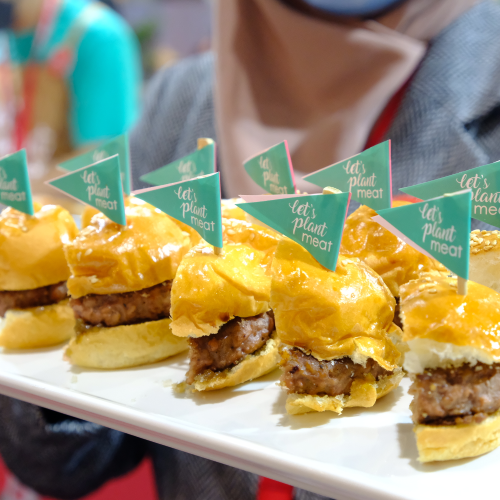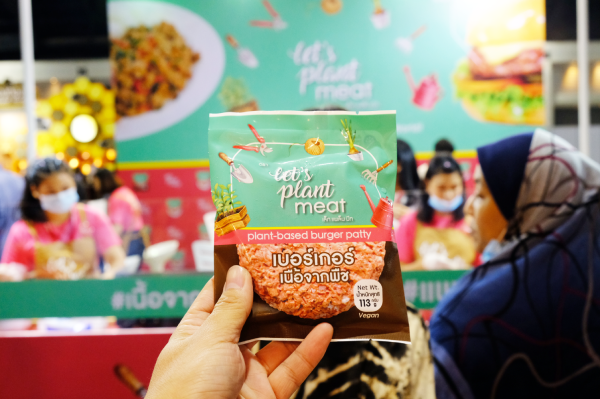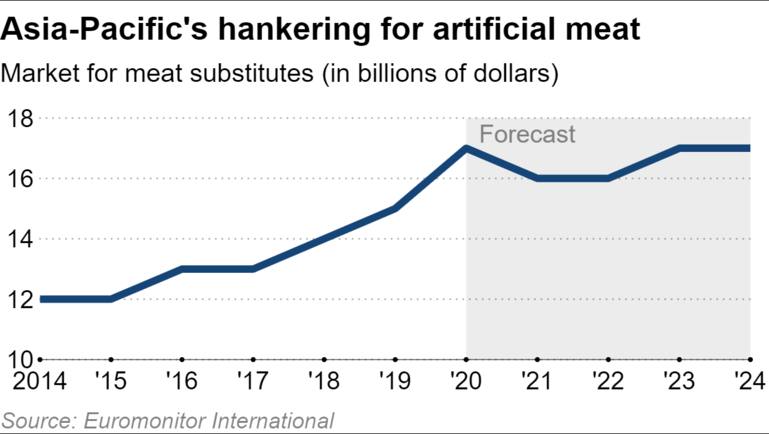Just when we thought we’ve heard every phrase coined in the startup universe, Khun Smith Taweelerdniti, the founder of Let’s Plant Meat says his vision is to build Protein as a Platform.

That’s right. The founder of Thailand’s plant based meat company, “Let’s plant Meat” has a vision for the industry, still in its infancy in Thailand, but reaching mass adoption in the western world.
When we think about plant based food, the household names of Beyond Meat and Impossible Foods come to mind. The two mega brands have become mega hits since their launch in the US.
Now, we have a local player on our hands. Smith is also the CEO of his Chiang Mai based family business, Nithi Foods, that manufactures and sells food flavoring products and spices.
Let’s Plant meat sells two products; beef patty and minced meat which consumers can use to cook up a delicious krapao dish at home. The products are made out of four plants – soy, rice, coconut and beetroot.
The patty, once cooked will be tender on the inside and already seasoned with herbs and spices to appeal to an Asian palette, and the minced meat has less flavor as the cooking method depends on personal preference.

The ecosystem from Nithi Food allows for faster, more efficient R&D (it literally took three months for the first prototype), larger manufacturing capabilities and funding. Concept to commercialization took just under a year.
From Global to Local
A bit of context: alternative meat players Beyond Meat and Impossible Foods managed to beat the early adopter curve. Like the tech media platform Robinhood Snacks said,” It doesn’t become a sustainable business until it’s widely adopted”, and not just by the wealthy millennials that have the financial freedom to try trends. It means consumers with middle income will be incentivized enough to buy it once, then maybe begin stocking it in their fridges every week.
Beyond Meat is now a highly valued public company with market cap of US$10 billion, which sells its patties to McDonald’s in Canada, launched a successful trial with KFC and supplies sausages to Dunkin’ Donuts.
Both Beyond Meat and Impossible Food are available at Walmart, the true definition of “going mass”. Now, the retailer has also just expanded its Beyond Meat stock to sell across 2,400 stores, up from an initial 800.
Impossible has less presence across Walmart stores, but enough, which means the retailer is now stocking both rival brands. We can expect both to butt heads in competing prices, which will mean that the gap between alternative meat and regular meat will narrow down even further.
As the American trend setters have established themselves beyond early adopters of vegans and wealthier consumers, that also means it’s time for the product to trickle down to Asia.
“Personally, I think that vegan and vegetarian trends in Thailand are mainly adopted to those exposed to westernized culture. There is a wealth stigma attached to alternative food. I want to make plant based meat accessible to everybody,” said Smith.
It’s an on-going journey though.
Smith took a look back at his own lifestyle, and decided to become a vegetarian in 2017. He hasn’t looked back since.
“There’s a stigma about adopting an alternative diet in Thailand that makes it difficult, when you go out to eat with friends or family, they push you to have more food, try this and that.”
Ultimately, once you adjust your mindset to eating better, holistically everything improves.
The path to going green-er
“It was a health conscious decision to become a vegetarian, but it was also an environmental one.”
Smith lives in Chiang Mai, which is constantly subject to burnings and fires, causing continuous pollution and generally bad air quality.
“It’s a way of life for Northerners to burn materials after producing crops, and those crops go into feeding animals that we eat. As long as we continue to consume meat, the air we breathe will continue to be polluted.”
Smith passionately circles back to the concept of practicing what you preach.
“We’ve become a generation of hypocrites. We can’t ask people to stop burning things if we are still going out to buy their produce. Therefore, I decided to take a step back and control what I consume.”
We also talked about the many misconceptions that surround vegetarianism, ranging from “oh, it makes you gain weight because of carbs,” to “it’s not actually that good for you.”
Then, it comes back to the question of, what about if you could combine something that was good for the planet and also tastes good? So, Smith began researching and eventually came across Beyond Meat on Youtube.
“For me, it dates back to 2017 when I first heard of Beyond Meat, I was impressed and intrigued by the company mission.”
Veganism and vegan culture in Bangkok is still mainly constrained to westernized Thais and expats, which can easily be seen at vegan friendly cafes in Sukhumvit. The Thai culture of “eating together” with friends and family can make venturing out to alternative diets tricky.
The stigma of meat itself is still considered a luxury product as well. So in 2017, it all started to come together for Smith, and he began asking all the right questions to tackle the localized product gap.
“Why does all products have to be from the US? I wanted to make a product that truly caters to Thai taste and wallet, something that is good for the body and for the environment”.
The Journey
Let’s Plant Meat launched at Tesco in March this year, selling beef patties at THB75, a significant slash from Beyond Meat’s THB150 price tag (Villa sells 2 Beyond patties for THB299).

“Lowering the price to be more affordable is definitely a conscious decision on my part. I want to make it easier for curious customers to make that switch.
Now, consumers can find Let’s Plant Meat across major supermarkets such as Tops, Foodland and Tesco Lotus, and Rimping supermarkets in Chiang Mai. Makro and Big C are next. Does this mean that the brand is reaching “mass adoption”? As Beyond Meat & Impossible did with Walmart? It’s a good sign, at the very least.
Wedged between a crowding market of international players, a lifestyle entry and price tag, Let’s Plant Meat diversifies itself by appealing to a Thai palette, with spices and flavoring that is fitting to our daily diet. This is a perk that many founders do not have the privilege of enjoying; blending together a traditional family business (in Smith’s case, Nithi Foods) with an innovative spin-off unit.
Because Nithi Foods is a foods flavoring business, Smith is able to rapidly build up capability in testing and adjusting the flavor to be tastier than the average plant based meat patty without an aftertaste.
“It’s a conscious choice,” he says, “do you want to contribute to the planet by making a choice to try something different? It doesn’t even have to be a 100% overhaul.”
“The opportunity is there for Thais to dive into research, articles and so much information out there. I spend weeks and months reading everything I can on the plant based process, but English is a barrier for many.”
Smith also credits Thailand’s food tech incubator Space F for helping him grow beyond concept and ideation.
“The incubator basically helped me to question, test and build out a business model. It made me think about things from a whole different angle.”
The Supply Chain issue
If we walk through the entire supply chain of meat, we’d understand that meat is a supermarket retailer’s “customer magnet”. There is a fixed cost and subsidies within the meat and protein industry that allows for mass accessibility. Gross profit is literally in single digits.
There is a certain price limit that protein cannot go beyond. For plant based, it hasn’t reached this point yet.
“Supermarkets are willing to accept lower margins in the meat section, because they make it up when that customer goes on to pick up packs of tissue and shampoo,” says Smith.
This is where it gets tricky for plant based meat in Thailand. When plant based meat and regular meat exit the factory, they cost the same. However, because plant based meat hasn’t been widely adopted, the downstream process puts it into the frozen section.
“The downstream process instantly turns plant based meat into a luxury item. Our GP is over 30%, VAT is 7%. It instantly becomes a luxury item for any household.”
This is where the industry hits a roadblock. The challenge going forward, according to Smith, is advocating how to move the needle for the industry to bypass these restrictions, and ultimately transition beyond a “luxury product”.
What’s next?
What’s next for Let’s Plant Meat? Aside from advocating for the whole alternative food industry to reach wider adoption, Smith also plans to roll out more products, continuously innovate and learn.
“We’re currently exploring alternative eggs, other meats and things,” he says, “if there is a fundamentally better way to consume for the environment and for yourself, why not give it a try?”
Currently, Let’s Plant Meat is selling exclusively in Thailand, with plans of venturing out into Southeast Asian markets as well as CLMV later in the pipeline. Singapore, expectedly, would be an ideal market to tap into. Singapore has cemented itself as the hub of many companies in Asia, and serve as the entryway into Asia for global companies.
Euromonitor International reported that the substitute meat market in the Asia-Pacific region was worth $15.3 billion in 2019. Covid-19 has accelerated the growth with growing concerns over safety and personal health, and now the market is forecast to expand 11.6% to $17.1 billion within this year. Even though competitors are growing, it’s a sizeable market and Let’s Plant Meat has an interesting angle to work with.

For now, Let’s Plant Meat is solely funded by the parent company, Nithi Foods, but Smith says he’s open to finding strategic investors who can help add value, particularly when the company plans to expand beyond Thailand.
“I would only be interested in partnering with strategic investors who can either help us break into new markets, or lend their expertise on something we lack.”
He’s also not too focused on becoming a “Unicorn”, something many media outlets and entrepreneurs fixate on.
“The biggest goal for me is to build a scalable, high growth business that is able to deliver.”
Bitesize’s take? We must admit that we haven’t adapted a plant based diet, but Let’s Plant Meat is one we’d like to see more of in Thailand, it’s encouraging to see a local player with a regional mindset, the potential of Let’s Plant Meat should serve as a good template for budding entrepreneurs in Thailand.
To find out more, head over to Let’sPlantMeat.co




